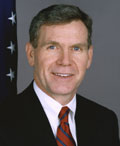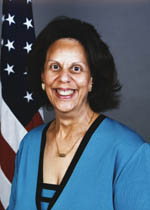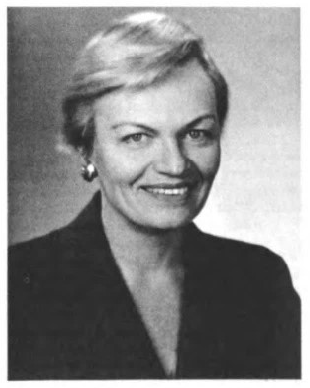
Frank Charles Carlucci III was an American politician who served as the United States Secretary of Defense from 1987 to 1989 in the administration of President Ronald Reagan. He was the first Italian American to serve in that position.

The Foreign Service Institute (FSI) is the United States federal government's primary training institution for members of the U.S. foreign service community, preparing American diplomats as well as other professionals to advance U.S. foreign policy objectives overseas and in Washington. FSI provides more than 800 courses—including up to 70 foreign languages—to more than 225,000 enrollees a year from the U.S. Department of State and more than 50 other government agencies and the military service branches. FSI is based at the George P. Shultz National Foreign Affairs Training Center in Arlington, Virginia.

Dr. María de Lourdes Dieck-Assad is a Mexican economist who has held positions in academia, an international organization, government and business, including professorships in the United States and Mexico as well as serving as Mexico's ambassador to Belgium, Luxembourg and the institutions of the European Union from 2004 to 2007. For her service in this capacity, she was awarded the Grand Cross of the Order of the Crown of Belgium. She attended the Monterrey Institute of Technology and Higher Education from 1971 to 1975, graduating with a bachelor's in economics. She received her master's in 1976 from Vanderbilt University and her doctorate in the same field from the University of Texas in Austin in 1983 with a dissertation entitled “The effect of economic shocks under different monetary procedures and different economic structures,” which she wrote as an intern at the Brookings Institution. She has said that she wanted to work to make an impact on Mexico since she was studying as an undergraduate, mostly in economic and social issues. Her husband is economist Pedro Quintanilla Gómez-Noriega. They lived in Austin, Texas for five years, where they both pursued doctoral studies in Economics. Then they went to live in Washington, DC where both worked. They returned to Mexico in 1992. When an opportunity came for Dieck-Assad to represent Mexico in Europe, she received the full support of her husband and her three children, who were already in high school and college.

The Lyndon B. Johnson School of Public Affairs is a graduate school at the University of Texas at Austin that was founded in 1970. The school offers training in public policy analysis and administration in government and public affairs-related areas of the private and nonprofit sectors. Degree programs include a Master of Public Affairs (MPAff), a mid-career MPAff sequence, 16 MPAff dual degree programs, a Master of Global Policy Studies (MGPS), eight MGPS dual degree programs, an Executive Master of Public Leadership, and a Ph.D. in public policy.

The Department of Foreign Affairs is the executive department of the Philippine government tasked to contribute to the enhancement of national security, protection of the territorial integrity and national sovereignty, to participate in the national endeavor of sustaining development and enhancing the Philippines' competitive edge, to protect the rights and promote the welfare of Filipinos overseas and to mobilize them as partners in national development, to project a positive image of the Philippines, and to increase international understanding of Philippine culture for mutually-beneficial relations with other countries.
A-100 is the colloquial name given to the introductory/orientation training class for incoming Foreign Service Officers. These courses are taught in the Foreign Service Institute at the National Foreign Affairs Training Center in Arlington, Virginia. The purpose of the class is to provide orientation to the United States Department of State, information on embassy operation and foreign affairs, intelligence collection and dissemination, State Department computer systems, and the roles different categories of personnel perform in the conduct of diplomacy. It is the basic job-orientation course for the United States Foreign Service before diplomats branch off into different career tracks or geographic specialties.

The Pepperdine University School of Public Policy (SPP) is a Master of Public Policy (MPP) degree program, located in Malibu, California with summer classes offered in Washington, D.C. It is one of four graduate schools at Pepperdine University. The MPP is customized with specializations in Applied Economic Policy, American Policy and Politics, International Relations and National Security, State and Local Policy, and Public Policy Dispute Resolution.

Richard Kenneth Fox, Jr. was United States Ambassador to Trinidad and Tobago (1977–79) and lifelong advocate for equal employment.

Gregory W. Engle is a United States Diplomat and former U.S. Ambassador to Togo. He was sworn in as ambassador on May 12, 2003. Greg Engle retired from the U.S. Foreign Service in 2008 and currently lives in Austin, Texas, where he teaches at the University of Texas and pursues his musical interests as a singer-songwriter. In January 2010, he released his first album, "Take It Personally," with noted producer/musician Stephen Doster and several well known Austin musicians. His song "Woody's Ghost" won first prize at the Annual Woody Guthrie Folk Festival Songwriting Competition in 2011.

Marilyn Priscilla Johnson was an American diplomat who served as United States Ambassador to Togo. She was appointed to that position on September 23, 1978, and left her post on July 29, 1981.

The George C. Marshall European Center for Security Studies is a bi-national United States Department of Defense and Federal Ministry of Defence (Germany) security and defense studies institute. When the Marshall Center was founded in 1993, its mission was to create a more stable security environment by advancing democratic institutions and relationships, especially in the field of defense; promoting active, peaceful, security cooperation; and enhancing enduring partnerships among the nations of North America, Europe, and Eurasia. As of Oct. 1, 2014, the Marshall Center's regional mission changed to a transnational one based on an Office of the Secretary of Defense directive to change from a European to a global participants' base.

Caroline Clendening Laise was an American civil servant, ambassador to Nepal and the first female Assistant Secretary of State.

Margaret Joy Tibbetts was an American diplomat. A career Foreign Service Officer, she was the United States Ambassador to Norway from 1964 to 1969 under President Lyndon Johnson. She attended Gould Academy, Wheaton College in Massachusetts and her Ph.D. from Bryn Mawr College. She was awarded an honorary degree from Bates College in 1962 and Bowdoin College in 1973.

The Bush School of Government & Public Service is an academic college of Texas A&M University founded in 1997 under former President George H. W. Bush's philosophy that "public service is a noble calling." Since then, the Bush School has continued to reflect that notion in curriculum, research, and student experience and has become a leading international affairs, political science, and public affairs institution.
Sidney Weintraub was an economist, foreign service officer, professor, non-fiction author, and novelist.
The Charles B. Rangel International Affairs Fellowship Program is a fellowship program that provides funding for graduate students as they prepare academically and professionally to enter the United States Foreign Service.

Aurelia Erskine Brazeal is a retired American diplomat who served as United States Ambassador to the Federated States of Micronesia, United States Ambassador to Kenya and United States Ambassador to Ethiopia.
Willard Ames De Pree was an American career diplomat who served as the United States Ambassador to Bangladesh and Mozambique.
John Russell Countryman, stage name Johnnie Russell, is an American former child actor and retired career officer for the United States Foreign Service.

Katherine W. Bracken was one of the few high-ranking female Foreign Service Officers (FSO) for the US Department of State in the late 1950s–1960s. She is notable for working at the Department and continuing to climb the ranks as a married woman during a time when the informal rule was for women to retire as soon as they were married.















